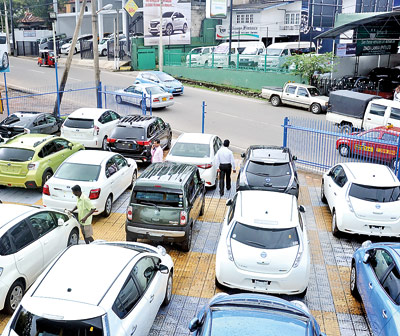News
Panic buying drives car market
Panic buying is driving the vehicle market ahead of the November 20 Budget, despite a price escalation.

New vehicles galore at car sale outlets in Colombo. Pix by Amila Gamage
Sales are going up, despite a request by Finance Minister Ravi Karunayake to the Sri Lankan business community in Japan not to send vehicles here until the budget was tabled in Parliament on November 20.
Thilak Gunasekera, immediate past President of Ceylon Motor Traders Association (CMTA) and Executive Director of Sathosa Motors, said the finance minister’s announcement had apparently triggered panic buying and his company’s sales went up in September.
According to sales figures, Sathosa Motors, which brings down Isuzu vheicles from Japan, 9,120 units were sold in August this year, but in September the sales soared to 14,500 units – recording a more than 59 percent jump, although prices too went up due to the depreciation of the rupee and a controversial valuation system being adopted by Customs.
Mr. Gunasekera said the new valuation system had shot up the prices of imported cars, especially from Japan. He charged that the new system lacked clarity and allowed room for Customs to make arbitrary valuation in calculating tax. This, had, sometimes, shot up the value by almost 50 percent of the cost of the vehicle.
He said the problem had been sorted out to some extent after vehicle importers met Finance Minister and held talks, during which they pointed out the need to follow World Trade Organisation (WTO) approved valuation practices.
Besides the new valuation system, the rupee depreciation has also led to a price increase in even vehicles imported from India.
“There is a difference of Rs.140,000 to Rs. 150,000 in the price of an Indian vehicle after the depreciation,” he said.
In yet another move to curb vehicle imports, the Government also announced a 70 percent rule for vehicle leasing. It was subsequently revised to a 90 percent rule, meaning a buy should meet ten percent of the value of the vehicle.
Mr. Gunasekera said the move had not deterred prospective automobile buyers. Some banks, not wanting to lose business, had come forward to give personal loans to car buyers so that they could pay their upfront payment in terms of the new leasing requirement.
Nishantha Perera, Managing Director or St. Anthony’s Traders, an automobile importing company based in Kelaniya, said sales were as usual although the price had gone up by between Rs. 700,000 and Rs.120,000 after the new valuation system was introduced.
He, too, attributed the trend to panic buying driven by fears that prices might further go up in the November budget.
However, Associated Motorways Managing Director Samantha Rajapaksa said he could feel an overall drop in sales because of ‘multiple reasons’.
He said that the requirement of 30% upfront payment on leasing from customers had been a damper on the market, while the controversial valuation system adopted by the Customs had given rise to many discrepancies, putting off customers.
He said he believed potential buyers were adopting a wait-and-see attitude in view of the upcoming Budget.
Meanwhile, electric car dealers are positive on the direction the car market is moving. They are happy sales are picking up.
Vehicle Importers Association President Sampath Merenchige said the Government, in keeping with its green environment policy, was interested in promoting electric cars.
He said the Government had proposed to increase the number of rapid charging points in Sri Lanka to boost the sales of electric cars.
An electric car can run only 120 to 130 km when its battery if fully charged and is not the preferred mode of transport for long distance travel.
At the moment there are only two rapid charging stations – one at Cotta Road in Colombo and the other in Galle near the light house.

